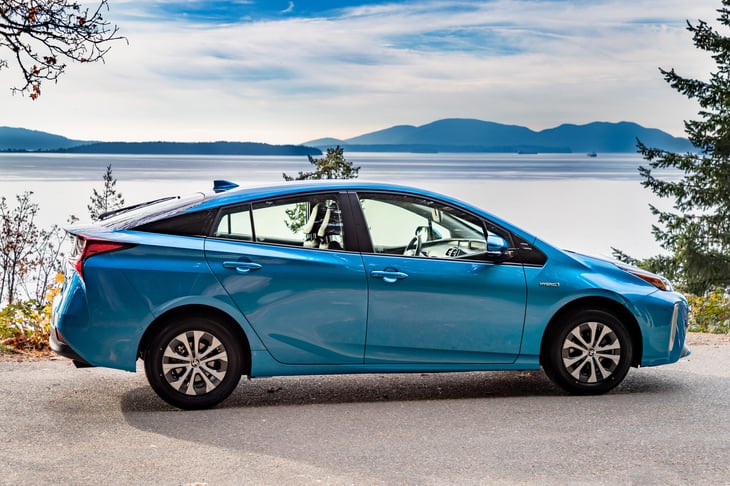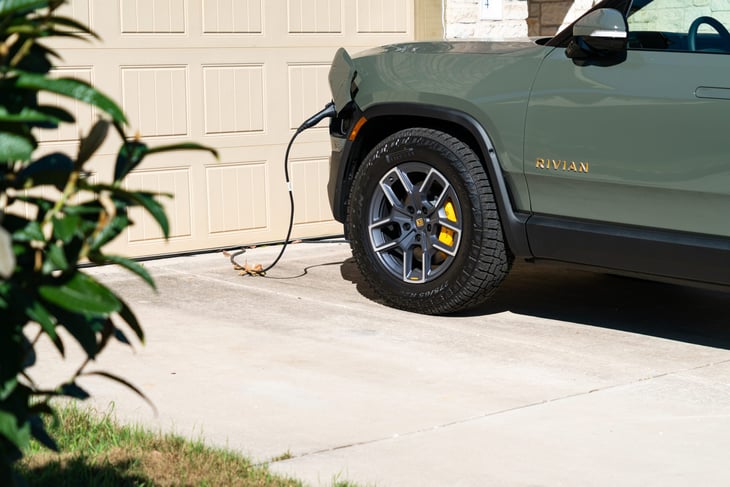
Editor's Note: This story originally appeared on The Penny Hoarder.
If you own an electric or hybrid vehicle, you should be prepared to pay a little extra when you renew your tags this year.
A growing number of states are charging drivers electric vehicle registration fees to offset lost fuel tax revenue.
What is this fee? Is an electric vehicle still worth it? We’ll break it down.
What Is an Electric Vehicle Registration Fee?

Electric vehicles come with a variety of benefits, including reduced maintenance requirements and quieter operation. But one of the biggest factors driving growth in EV sales is fuel savings.
In short, because electric vehicles don’t require gas, you save money at the pump.
But this move toward EVs poses a problem for local governments. Taxes from fuel sales fund expenses like road maintenance. As fewer vehicle owners buy fuel, that tax fund dwindles, but roads still need to be maintained.
For that reason, more than 30 states have implemented a road use fee for electric vehicle owners that is in addition to traditional registration. Some EV owners pay more than $200 a year to register or renew their tags.
Hybrid vehicle owners also are on the hook. The fees may be lower, but most of these states also are charging extra fees for plug-in hybrids.
Electric Vehicle Registration Fees by State

The list of states charging extra for electric vehicle registration renewal is growing.
As of now, though, here’s what each state is charging to renew EVs and plug-in hybrid vehicles.
Fees by State

Here are EV fees and plug-in hybrid fees by state.
- Alabama: $203, $103
- Arkansas: $200, $100
- Colorado: $54.47, $54.47
- Georgia: $210.87, $210.87
- Hawaii: $50, $50
- Idaho: $150, $75
- Illinois: $100, N/A
- Indiana: $221, $74
- Iowa: $130, $65
- Kansas: $100, $50
- Kentucky: $120, $60
- Louisiana: $110, $60
- Michigan: $140, $50
- Minnesota: $75, N/A
- Mississippi: $150, $75
- Missouri: $105, $52.50
- Montana: $130, $70
- Nebraska: $75, N/A
- New Hampshire: $100, $50
- North Carolina: $180, $90
- North Dakota: $120, $50
- Ohio: $200, $150
- Oklahoma: $110, $82
- Oregon: $86-$316, N/A
- South Carolina: $120, $60
- South Dakota: $50, $50
- Tennessee: $200, $100
- Texas: $200, N/A
- Utah: $138.50, $60.25
- Vermont: $89, N/A
- Virginia: $123.98, $123.98
- Washington: $225, $75
- West Virginia: $200, $200
- Wisconsin: $175, $75
- Wyoming: $200, N/A
The cost to register an electric or hybrid vehicle is higher in Arizona and California, but registration fees are based on the price of the vehicle. You’ll need to use the calculator on the Department of Motor Vehicles website for each state to get the exact amount.
Budgeting for EV Registration Fee Hikes

These fees don’t have to sneak up on you. Bills like these often make their way through the legislature throughout the year. Keep an eye on electric vehicle legislation that might increase existing fees or introduce new ones.
Your state also may not yet have a hybrid car registration fee. It’s termed “alternative fuel vehicles,” and some states only add fees onto your registration if yours is a plug-in model.
A smaller group of states charge a fee for hybrid vehicles that don’t rely on an external power source.
Factoring the cost into your budget is the first step in facing the fee.
“You can prepare for state EV fees by seeing how much your state charges and setting the money aside so you’re prepared,” said Todd Stearn, founder of The Money Manual.
Electric and Hybrid Vehicle Incentives

Though no one likes an added fee, there often are tax breaks and incentives available to electric vehicle owners.
“Figuring out your EV savings can require countless hours of research to sort through complex incentive qualification rules, fuel savings and charging costs,” said Peter Glenn, founder of EV Life, which provides an EV savings calculator.
“Every person’s case is different.”
Here are some of the top incentives available to electric vehicle owners.
1. Tax Credits and Rebates

Before you file your taxes each year, see if your electric vehicle qualifies for a tax credit (the list of qualifying vehicles changes each year).
Some are as much as $7,500. The U.S. Department of Energy has a search tool for that. If so, you’ll need to file Form 8936.
But tax credits aren’t limited to your federal tax filing. Many states have tax credits and rebates available for electric and hybrid vehicle owners.
You’ll also find discounts on utility bills in some areas. Check this list to make sure you aren’t missing anything.
2. HOV Lane Access

Sitting in traffic can be a pain. In some states, though, EV drivers can switch to the high occupancy vehicle (HOV) lane even when driving alone. In at least 20 states, you’ll get some form of HOV lane privilege.
Don’t just start driving in the HOV lane, though. Check your state’s requirements before you hit the road.
Some states issue a special license plate. Others require a decal or express lane pass to drive alone in the HOV lane.
3. Home Charger Installation Assistance

Being able to charge your vehicle at home can make EV registration charges worth it. However, unless you can install the charger on your own, electric vehicle charger installation can be pricey.
As you’re looking around for rebates and tax credits, keep an eye out for home charger installation rebates.
Local utility companies sometimes offer these, but you’ll also sometimes see tax credits for installation in certain areas.
Do a Cost-Benefit Analysis

Though big savings on gas and car maintenance may not feel immediate, when spread over multiple years, it can be significant.
“While the tax may add an annual cost, it’s essential to consider the long-term economic and environmental benefits of EVs,” said Rob Dillan, founder of EVHype.
“For instance, the U.S. Department of Energy estimates that EVs can save drivers about $14,500 in fuel costs over 15 years.”
As more states enact electric vehicle registration fee legislation, EV and hybrid owners should keep a close watch. Being prepared will allow you to enjoy your ongoing cost savings without that sticker shock at renewal time.





Add a Comment
Our Policy: We welcome relevant and respectful comments in order to foster healthy and informative discussions. All other comments may be removed. Comments with links are automatically held for moderation.